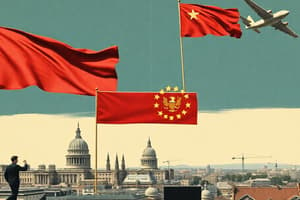Podcast
Questions and Answers
Pada masa kuno dan abad pertengahan, perbedaan sering kali lebih diutamakan daripada...
Pada masa kuno dan abad pertengahan, perbedaan sering kali lebih diutamakan daripada...
- integrasi (correct)
- diversifikasi
- penggabungan
- ekspansi
Kesatuan politik antara Athena dan Sparta dipengaruhi oleh...
Kesatuan politik antara Athena dan Sparta dipengaruhi oleh...
- sistem politik yang serupa
- perbedaan budaya (correct)
- kesamaan seni
- persamaan ideologi
Keberhasilan Ekspansi Kekaisaran Romawi disebabkan oleh kombinasi...
Keberhasilan Ekspansi Kekaisaran Romawi disebabkan oleh kombinasi...
- kekuatan politik dan integrasi budaya
- teknologi militer dan ekonomi
- ekspansi wilayah dan konflik internal
- militer dan integrasi budaya (correct)
Periode mana yang ditandai dengan munculnya gerakan nasionalis di Eropa Barat?
Periode mana yang ditandai dengan munculnya gerakan nasionalis di Eropa Barat?
Upaya untuk mengendalikan wilayah negara dilakukan oleh institusi negara pada masa pemerintahan...
Upaya untuk mengendalikan wilayah negara dilakukan oleh institusi negara pada masa pemerintahan...
Perbedaan etnis, linguistik, agama, dan ekonomi menjadi tantangan signifikan dalam...
Perbedaan etnis, linguistik, agama, dan ekonomi menjadi tantangan signifikan dalam...
Pada zaman apa terjadi peningkatan kesadaran identitas budaya dengan munculnya era Pencerahan?
Pada zaman apa terjadi peningkatan kesadaran identitas budaya dengan munculnya era Pencerahan?
Siapakah filsuf yang mengembangkan konsep Volksegist?
Siapakah filsuf yang mengembangkan konsep Volksegist?
Apa yang menjadi tujuan dari le Grand Design yang dilakukan oleh Raja Louis XIV di Perancis?
Apa yang menjadi tujuan dari le Grand Design yang dilakukan oleh Raja Louis XIV di Perancis?
Apa yang dipicu oleh dekolonisasi yang terjadi setelah Perang Dunia II?
Apa yang dipicu oleh dekolonisasi yang terjadi setelah Perang Dunia II?
Apa yang terjadi setelah Perang Dunia I yang menjadi titik balik dalam sejarah?
Apa yang terjadi setelah Perang Dunia I yang menjadi titik balik dalam sejarah?
Pada abad ke berapa banyak wilayah koloni mencari kemerdekaan, meningkatkan konflik global?
Pada abad ke berapa banyak wilayah koloni mencari kemerdekaan, meningkatkan konflik global?
Study Notes
Unity and Diversity of Nations throughout History
Throughout time, various civilizations have grappled with the delicate balance between unity and diversity within their own territories and among neighboring communities. This complex interplay is particularly evident when exploring the evolution of nationhood across history. Let's delve into this fascinating journey by examining some key moments and concepts.
Antiquity and Medieval Period
During antiquity and medieval times, differentiation often took precedence over unification. City-states like Athens and Sparta fostered unique identities through their distinct political systems, arts, and ideologies. In Europe, tribalism persisted despite efforts towards Christianization and centralized monarchical rule.
The Roman Empire presented a stark contrast, achieving unprecedented expansion through both military force and cultural integration. However, its expansive borders eventually led to internal conflicts and fragmentation—a common theme in the formation of empires.
Rise of European Nation States
Beginning around the Late Middle Ages, nationalist movements started emerging across Western Europe. State institutions began asserting control under the reign of absolute monarchs. Colonial conquests extended these boundaries even further. Yet, ethnic, linguistic, religious, and economic differences still presented significant challenges.
A notable exception was France, where King Louis XIV successfully centralized power during his lengthy reign (1643–1715) via le Grand Design, which aimed to reinforce royal authority, nationalize Catholicism, expand French territory, and establish cultural hegemony.
Enlightenment Era and Nationalism
With the rise of the Age of Enlightenment came enhanced awareness of cultural identity. Intellectuals, such as Jean Jacques Rousseau and Immanuel Kant, popularized ideas regarding collective rights and self-determination, advocating for more inclusive forms of governance.
As philosophers questioned existing orthodoxies, new concepts emerged reflecting diverse worldviews. For instance, Johann Gottfried Herder developed the concept of Volksegist, suggesting each nation possesses a unique spirit or essence, thereby justifying calls for independent states based upon distinct traditions and languages.
Modern Nation Building and Global Conflict
In response to imperial decline and the growing influence of nationalism during the 19th century, many colonized regions sought independence, leading to increased global conflict. Simultaneously, industrialization facilitated mass communication, transportation, and urban growth – changes that exacerbated friction yet also fueled progress towards international cooperation.
World War I marked a turning point wherein the destruction of prewar alliances and widespread dissatisfaction fomented demands for national sovereignty. Post-conflict treaties including the Treaty of Versailles resulted in new state formations, though they did little to quell ongoing tensions.
Decolonization and Contemporary Challenges
Following World War II, decolonization accelerated, resulting in the creation of numerous newly independent countries – primarily in Africa and Asia. Despite hopes for peaceful coexistence and postcolonial prosperity, regional conflict remained prevalent due to enduring geopolitical rivalries, resource scarcity, and shifting demographics.
Today, issues surrounding multicultural citizenship remain pertinent globally. Newly formed democracies struggle to reconcile competing interests while established governments grapple with reinforcing solidarity amidst the bewildering array of increasingly influential minority groups and transnational phenomena.
Studying That Suits You
Use AI to generate personalized quizzes and flashcards to suit your learning preferences.
Description
Explore the intricate balance between unity and diversity throughout history, focusing on the evolution of nationhood. Delve into key moments from antiquity to contemporary challenges, including the rise of European nation states, Enlightenment era philosophies, modern nation building, and post-colonial decolonization.




